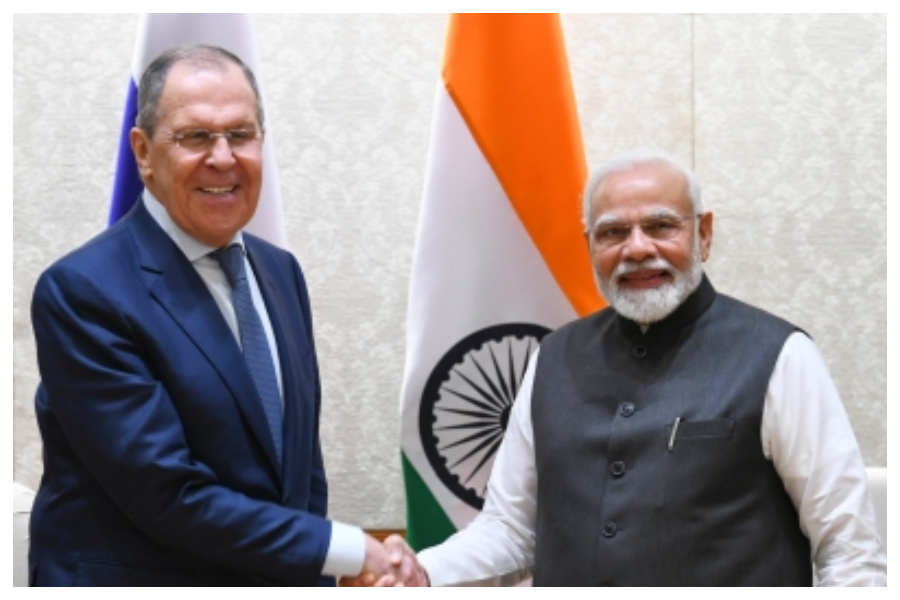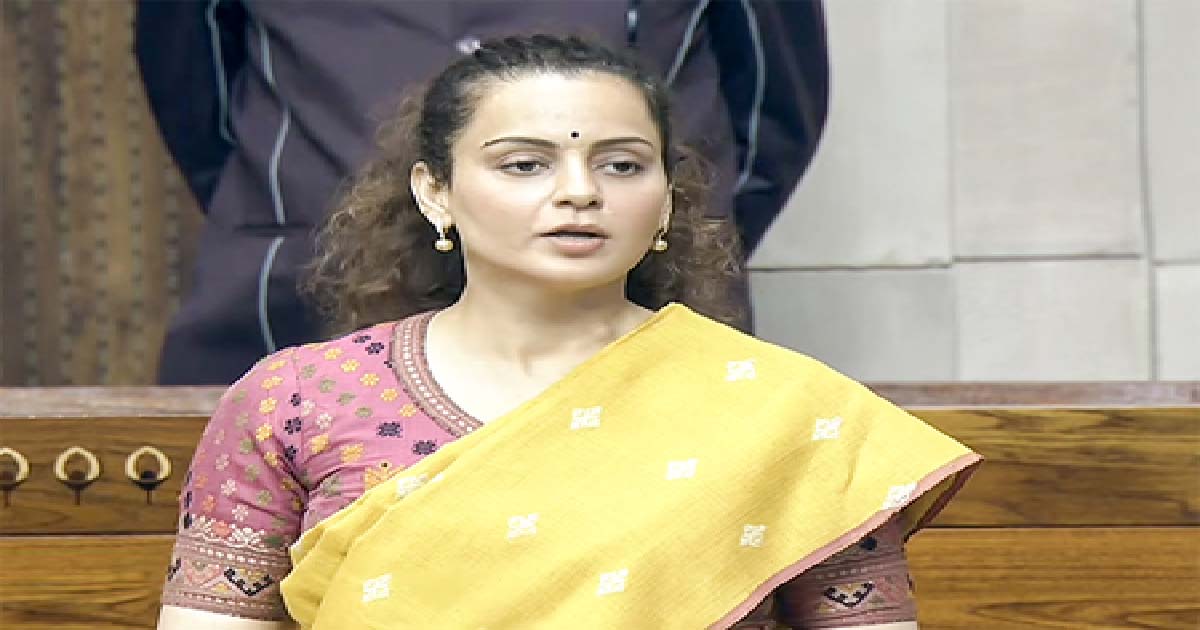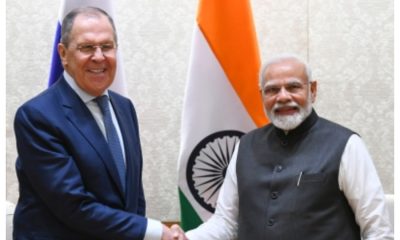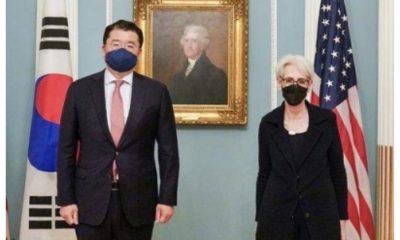International News
Lavrov meets Modi, apprises him of Ukraine crisis, bilateral initiatives

Russian Foreign Minister Sergey Lavrov met Indian Prime Minister Narendra Modi here on Friday and apprised him about the ongoing crisis in Ukraine.
According to a statement issued by the Ministry of External Affairs, Lavrov briefed the Prime Minister on the situation in Ukraine, including the ongoing peace negotiations.
Modi reiterated his call for an early cessation of violence, and conveyed India’s readiness to contribute in any way to the peace efforts, the statement said.
The meeting lasted for 40 minutes during which Lavrov also informed the Prime Minister about various bilateral initiatives.
He, thereafter, left the Prime Minister Office’s but got stuck slightly in a traffic jam for a few minutes on way to the IGI airport to fly back to Moscow.
Ahead of meeting Prime Minister Modi, Lavrov has said US pressure would not affect the India-Russia relationship and added if India wants to mediate for resolution to the Ukraine problem, such a process can be supported.
Lavrov was on a two-day visit to India where he held deliberations with his Indian counterpart S. Jaishankar over crude oil offer, rupee-ruble payment, ongoing arms deals, Ukraine crisis, and the situation in Afghanistan and Iran.
About India playing a bigger role in the Ukraine crisis, Lavrov said: “India is an important and serious country. If India plays that role that provides resolution, India as our common partner.. we are for the security guarantee of Ukraine.. West has ignored it’s responsibility…If India is with its position of just and rational approach to international problems.. can support such a process.”
On India’s view on the Ukraine crisis, he said that India’s foreign policy is guided by its independent position.
“I believe that Indian foreign policies are characterised by independence and the concentration on real national legitimate interests. The same policy is based in the Russian Federation and this makes us, as big countries, good friends and loyal partners.”
India has stayed neutral on seven Ukraine-related resolutions at the United Nations.
Lavrov categorically said Russia’s aim in Ukraine is to deprive the Kiev regime from building the capacity to present any threat to Russia.
During interaction with media persons here, Lavrov, talking about the Ukraine crisis said: “You called it a war, which is not true. It is a special operation, military infrastructure is being targeted. The aim is to deprive the Kiev regime from building the capacity to present any threat to Russia.”
In their meeting, Lavrov and Jaishankar assessed the overall state of cooperation and considered the implications of recent developments on trade and economic relations.
The two ministers discussed developments pertaining to Ukraine.
Lavrov briefed the Indian side on Russia’s perspective, including the ongoing talks. Jaishankar emphasised the importance of cessation of violence and ending hostilities. Differences and disputes should be resolved through dialogue and diplomacy and by respect for international law, UN Charter, sovereignty and territorial integrity of states, he added.
The ministers also discussed the situation in Afghanistan. Lavrov conveyed his assessment of the recent conference on Afghanistan in China. Jaishankar noted that UNSCR 2593 expressed the concerns of the international community and spoke of humanitarian support for the Afghan people. Iran and the JCPoA issue were also featured in the talks.
On the supply of crude and arms, Lavrov said Russia will be ready to supply to India any goods which India wants to buy from them. “We are ready to discuss. Russia and India have very good relations,” he said.
Asked whether the rouble-rupee system for bilateral trade is being worked out, Lavrov said: “We have to find ways to bypass impediments.”
Business
India-Russia friendship steady like pole star amid global uncertainty: PM Modi

New Delhi, Dec 5: Hailing India-Russia ties, Prime Minister Narendra Modi on Friday said that the friendship between the two countries has remained like a pole star amidst the ups and downs faced by the world in the past 80 years.
While making a joint press statement with Russian President Vladimir Putin following their talks at the Hyderabad House in New Delhi on Friday, PM Modi said that the ties between two nations have stood the test of time and thanked Putin for his friendship and unwavering commitment to India while recalling the efforts made by the Russian leadership to elevate bilateral ties.
“Today, I am delighted to welcome President Putin to the 23rd India-Russia Summit today. His visit comes at a time when our bilateral relations are experiencing several historic milestones. 25 years back, President Putin laid the foundation for our strategic partnership. 15 years ago, in 2010, our partnership was granted the status of a Special Privileged Strategic Partnership. For the past two and a half decades, he (President Putin) has nurtured this relationship with his leadership and vision.
“His (President Putin) leadership, under all circumstances, has elevated our ties to new heights. I express my heartfelt gratitude to President Putin, my friend, for this deep friendship and unwavering commitment to India. The world has seen many ups and downs over the past eight decades. Humanity has faced many challenges and crises and amidst all this, the India-Russia friendship has remained like a pole star. This relationship, founded on mutual respect and deep trust, has always stood the test of time,” he added.
Recalling recent heinous terror attacks in both countries, PM Modi said that India and Russia have stood together in the fight against terrorism.
“Today we also discussed regional and global issues. India and Russia have long cooperated shoulder to shoulder in the fight against terrorism. Whether it’s the terrorist attack in Pahalgam or the cowardly attack on Crocus City Hall — the root of all these incidents is the same. India firmly believes that terrorism is a direct attack on the values of humanity and global unity against it (terrorism) is our greatest strength.”
PM Modi announced that India and Russia will cooperate to train Indian seafarers in polar waters. “We will now cooperate to train Indian seafarers in polar waters. This will not only strengthen our cooperation in the Arctic, but will also create new employment opportunities for India’s youth.”
Reiterating India’s stance on Ukraine conflict, he said, “India has advocated for peace in Ukraine from the very beginning. We welcome all efforts to find a peaceful and lasting solution to this issue. India has always been ready to contribute and will continue to do so.”
PM Modi also termed energy security as a strong and important pillar of India-Russia partnership. He stated that cooperation between India and Russia in civil nuclear energy has been crucial in realising shared clean energy priorities.
“Energy security has been a strong and important pillar of the India-Russia partnership. Our decades-old cooperation in civil nuclear energy has been crucial in realising our shared clean energy priorities. We will continue this win-win cooperation. Our cooperation in critical minerals is crucial to ensuring secure and diversified supply chains across the world,” stated PM Modi.
Earlier, taking the India-Russia Special and Privileged Partnership ahead, PM Modi warmly welcomed President Putin at the Hyderabad House to participate in the 23rd India-Russia Annual Summit.
With both countries sharing a longstanding and time-tested bond, the two leaders are holding comprehensive and detailed discussions aimed at further strengthening the bilateral relations.
International News
‘Govt follows protocol’: BJP respond after Rahul Gandhi remarks on Oppn-Putin meeting

New Delhi, Dec 4: After Congress MP Rahul Gandhi alleged that the Centre has been advising foreign delegations against meeting or interacting with the Leader of the Opposition (LoP) – a practice he said was followed during previous UPA and NDA regimes, ruling party leaders on Thursday rejected the claim, asserting that the “government follows due protocol” in all matters.
The startling charge by Rahul Gandhi, while speaking to reporters outside Parliament, comes hours ahead of Russian President Vladimir Putin’s two-day visit to India. His remarks are set to raise eyebrows in the political corridors and also set the stage for heated sparring between the BJP and Congress.
Rahul Gandhi said, “Meetings with the LOP take place with delegations coming from outside. It has been a long-held tradition and has always been done this way,” he said, while citing instances during Manmohan Singh and Atal Bihari Vajpayee governments.”
Speaking to Media, BJP MP Kangana Ranaut said, “These decisions are made by the government. Atal ji was a national asset, and the entire country was proud of him. He was a great patriot. I don’t know why Rahul Gandhi is not being allowed, but in my opinion, his commitment to the nation is questionable. His role in creating unrest and trying to divide the country raises doubts about his intentions. And if Rahul Gandhi is comparing himself to Atal ji, then I would suggest he join the BJP — only then could he become like him.”
BJP MP Bhim Singh said, “Why would the government stop him? He only creates chaos and does not speak where he is supposed to speak.”
Echoing a similar stance, BJP MP Brij Lal added, “The government follows protocol, and work will be carried out accordingly. Rahul Gandhi is only making this political.”
JD(U) leader K. C. Tyagi clarified, “The government does not decide such protocols. Visiting heads of state themselves decide whom they wish to meet.”
Union Minister Ramdas Athawale added, “Foreign leaders visit on the invitation of the ruling party or government. If President Putin wishes, Rahul Gandhi, as LoP, can meet him. The government has no role in that.”
International News
Trump says Putin ‘would like to end war’ with Ukraine

Washington, Dec 4: US President Donald Trump said Russian President Vladimir Putin “would like to end the war” in Ukraine, citing what he described as a “very good meeting” between Putin and two close Trump allies, Jared Kushner and Steve Witkoff, in Moscow.
Trump told reporters at the White House on Wednesday (local time) that he had spoken with Kushner and Witkoff following their talks with Putin. “Their impression was that he would like to see the war ended,” Trump said. “I think he’d like to get back to a more normal life. I think he’d like to be trading with the United States of America, frankly, instead of losing thousands of soldiers a week.”
Trump added, “I thought they had a very good meeting yesterday with President Putin. We’ll see what happens. It’s a war that should never have been started. It’s a war if I were president… that war would have never happened.”
He also reiterated his longstanding claim that the conflict would not have erupted if he had been in office. “If I were president, no war would have ever happened. They would have had 100 per cent of their territory. Nothing would have happened,” he said.
Trump described the battlefield toll as catastrophic. “Think of this — last month, 27,000 soldiers… mostly young soldiers died last month; in one month,” he said. “That’s the only reason I’m trying to help.”
He also said the US was no longer directly financing Ukraine’s war effort, telling reporters, “We’re not spending any money in the war, we’re selling to NATO. We’re not being ripped off like we were under Biden.”
Asked about Kremlin statements suggesting no compromise was forthcoming, Trump replied, “I don’t know what the Kremlin is doing.”
The Trump team’s back-channel contacts with Moscow have drawn global attention amid stalled frontline dynamics and ongoing diplomatic efforts. Casualty figures in the conflict remain contested, while the United States and European allies continue to debate next-phase military and political frameworks for ending the war.
President Putin arrives in New Delhi on Thursday for a summit talk with Prime Minister Narendra Modi.
-

 Crime3 years ago
Crime3 years agoClass 10 student jumps to death in Jaipur
-

 Maharashtra1 year ago
Maharashtra1 year agoMumbai Local Train Update: Central Railway’s New Timetable Comes Into Effect; Check Full List Of Revised Timings & Stations
-

 Maharashtra1 year ago
Maharashtra1 year agoMumbai To Go Toll-Free Tonight! Maharashtra Govt Announces Complete Toll Waiver For Light Motor Vehicles At All 5 Entry Points Of City
-

 Maharashtra1 year ago
Maharashtra1 year agoFalse photo of Imtiaz Jaleel’s rally, exposing the fooling conspiracy
-

 National News1 year ago
National News1 year agoMinistry of Railways rolls out Special Drive 4.0 with focus on digitisation, cleanliness, inclusiveness and grievance redressal
-

 Maharashtra1 year ago
Maharashtra1 year agoMaharashtra Elections 2024: Mumbai Metro & BEST Services Extended Till Midnight On Voting Day
-

 National News1 year ago
National News1 year agoJ&K: 4 Jawans Killed, 28 Injured After Bus Carrying BSF Personnel For Poll Duty Falls Into Gorge In Budgam; Terrifying Visuals Surface
-

 Crime1 year ago
Crime1 year agoBaba Siddique Murder: Mumbai Police Unable To Get Lawrence Bishnoi Custody Due To Home Ministry Order, Says Report


















